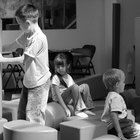
Effective communication within the family can lead to better relationships between the members of the family. It must be built on a foundation of trust, listening and understanding. The more effectively your family can communicate together, the better. It will keep you open to share thoughts and feelings, coax expression out of your children and foster a safe home environment in which all members of your family can feel comfortable and secure in their relationships.
Effective Family Communication
Outside of the home, communication is when you express your thoughts, feelings and opinions to someone else, while they listen and reciprocate. In the home, communication takes on a much more personal level. When you communicate within your family, you can expect a listening ear that can gently soothe or an honest opinion to direct you on the right path. Making sure that your family works on communication skills can keep your family tightly knit while being open and honest with each other.
Self-Esteem
The children of parents who allow them to freely express their feelings, thoughts and opinions have higher self-esteem overall, hypothesizes the University of Delaware. This is because they are raised in an environment where their thoughts and opinions are valued and recognized. When they go to school, head to extracurricular activities or participate in social events, they won't be shy to express themselves.
Expression of Feelings
Anger subsides when a child learns to effectively communicate her feelings, says the University of Florida. Learning how to effectively express feelings can reduce the arguing and yelling in a household as well as increase satisfaction and the sharing of feelings. When a family knows how to communicate effectively, then all of the members of the household learn conflict management, problem-solving skills and the sharing of thoughts and ideas.
Acting Out
Some children learn to act out or create problems for shock value when they want attention from their parents. When parents and siblings allow for better communication, there is no need for children to use those shock tactics, because they are given the time and patience to talk about their feelings and communicate their needs.
Listening Skills Development
Effective communication in the home will stay with children as they move through their lives. The communication skills of expression, listening and conflict resolution will affect their school, social and eventual professional life. They'll learn how to listen effectively, reserving judgment and showing empathy. They'll learn the right words to use when communicating with others. And most of all, they'll develop skills that will affect all of their future relationships; professional, educational and personal.
Related Articles

Family Conflict Examples

How to Repair Broken Family Ties

A Lack of Communication in the Family

Lasting Effects on Adult Children of ...

The Advantages of Communication With ...

How to Stop Fighting Among Older Adult ...

How Does a Controlling Spouse Affect a ...

What Are the Benefits of Effective ...

How Children Are Affected When Living ...

How Poor Relationships Affect the Family

How to Deal With Family Backstabbers at ...

The Effects of Separation & Divorce on ...

What Effects Can Stress Have on a ...

Effects of Divorce on Children in ...

Importance of Family Structure in ...

Team Building Activities for Family ...

How Does Technology Affect Family ...

Conflict Theory & the Family

How to Deal With a Crisis in Your Family

Qualities of a Good Brother
References
Writer Bio
Kay Ireland specializes in health, fitness and lifestyle topics. She is a support worker in the neonatal intensive care and antepartum units of her local hospital and recently became a certified group fitness instructor.
Photo Credits
Image by Flickr.com, courtesy of -77-